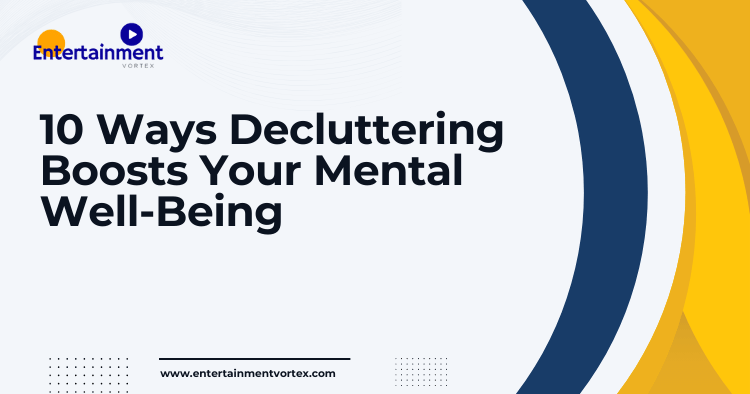Table of Contents
- Introduction
- 1. Reduces Stress and Anxiety
- 2. Enhances Focus and Productivity
- 3. Promotes Better Sleep
- 4. Encourages Mindfulness
- 5. Boosts Self-Esteem
- 6. Creates a Sense of Control
- 7. Fosters Creativity
- 8. Improves Relationships
- 9. Increases Motivation
- 10. Provides a Fresh Start
- Conclusion
- FAQs
Introduction
In today’s fast-paced world, clutter—whether physical or mental—can accumulate quickly. Many may not realize the significant impact that their environment has on their mental health. Decluttering goes beyond mere tidying; it can lead to transformative improvements in mental well-being. This article explores ten ways decluttering can boost your mental health, along with practical tips to help you on your journey toward a more organized mind and space.
1. Reduces Stress and Anxiety
Clutter can feel overwhelming, leading to increased stress and anxiety. Research published in the Personality and Social Psychology Bulletin found that individuals who describe their homes as cluttered experience higher levels of depression and fatigue. By decluttering, you can create a tranquil environment that fosters relaxation and reduces stress.
“Creating a calm space is essential for mental well-being. A serene environment can work wonders for your mood.”
Quick Tip:
Start small—focus on a single drawer or corner to make the task manageable.
2. Enhances Focus and Productivity
An organized space allows for better concentration on tasks at hand. Clutter scatters attention and can hinder information processing, as shown by research from Princeton University. By decluttering your workspace, you can create an environment conducive to improved focus and productivity.
“Your environment can either fuel your creativity or stifle it. Choose wisely!”
Quick Tip:
Keep only essential items on your desk and store away unnecessary distractions.
3. Promotes Better Sleep
A decluttered bedroom can significantly enhance your sleep quality. Clutter can lead to a restless mind, making it hard to unwind. According to the National Sleep Foundation, a clean sleeping environment promotes better rest and relaxation.
“Sleep is crucial for mental health; a peaceful space can make all the difference.”
Quick Tip:
Maintain a tidy bedroom by making your bed daily and keeping bedside tables clear.
4. Encourages Mindfulness
Decluttering can serve as a form of mindfulness practice, encouraging you to be present while sorting, organizing, and letting go of items. Engaging in this process can help cultivate mindfulness, which can alleviate symptoms of anxiety and depression.
“Mindfulness isn’t just about meditation; it can be woven into everyday tasks like decluttering.”
Quick Tip:
Dedicate time weekly to reflect on your possessions, asking yourself which truly brings you joy—a concept popularized by Marie Kondo.
5. Boosts Self-Esteem
Taking control of your space can enhance your self-esteem. Seeing the results of your decluttering efforts boosts confidence and makes you feel capable. A study in the Journal of Environmental Psychology highlights that individuals with organized spaces report higher self-satisfaction.
“Every small victory in decluttering is a step towards greater self-worth.”
Quick Tip:
Celebrate your decluttering milestones with small rewards for each completed space.
6. Creates a Sense of Control
Decluttering allows you to regain control over your environment, empowering you to make choices aligned with your values and goals. This sense of control can significantly decrease feelings of helplessness and improve mental health.
“Regaining control over your space can lead to a more fulfilling life.”
Quick Tip:
Set specific decluttering goals, like tackling one area each day or completing a room each weekend.
7. Fosters Creativity
A clutter-free environment can unleash your creative potential. When your space is organized, your mind is free to explore new ideas without distraction. Research from the University of Minnesota found that individuals in tidy environments exhibit greater creativity.
“Creativity flourishes in spaces that are clear and organized.”
Quick Tip:
Designate a clutter-free area as your creative zone, filled with inspiration but free of distractions.
8. Improves Relationships
Clutter often leads to tension in relationships. Shared spaces can become points of contention, causing stress. Working together to declutter can foster teamwork and communication, ultimately strengthening your relationships, as noted by the American Psychological Association.
“Collaboration in decluttering can bring you closer and create shared goals.”
Quick Tip:
Organize a decluttering day with family or friends—make it enjoyable with snacks and music!
9. Increases Motivation
A clean, organized space can provide the motivation needed to tackle new challenges. Decluttering creates an inviting atmosphere that encourages action. Research indicates that tidy environments lead to higher motivation and overall satisfaction.
“An inspiring space can ignite the fire of motivation within you.”
Quick Tip:
Create a vision board in your decluttered space to remind you of your aspirations and motivate you to act.
10. Provides a Fresh Start
Decluttering symbolizes a fresh start. Letting go of items that no longer serve you can be liberating, allowing you to move forward with a renewed mindset. This fresh start can inspire positive changes in various life aspects, enhancing your overall mental health.
“Letting go can be just as important as bringing new things into your life.”
Quick Tip:
Consider making decluttering an annual ritual to ensure your belongings continue to align with your current life.
Conclusion
Decluttering is more than a chore; it’s an investment in your mental well-being. The positive impacts of creating an organized environment include reduced stress, improved focus, and better relationships. Why not start today? Embrace decluttering and discover the transformative effects it can have on your life.
FAQs
Q: How do I get started with decluttering?
A: Begin with one small area, set a timer for 15 minutes, and sort items into keep, donate, and discard categories.
Q: What should I do with items I no longer need?
A: Consider donating them to local charities, selling them online, or recycling them when possible.
Q: Is there a psychological benefit to decluttering?
A: Yes! Decluttering promotes mindfulness, boosts self-esteem, and enhances overall mental well-being.
Q: How often should I declutter?
A: Aim to declutter seasonally or whenever you feel overwhelmed by your belongings.
For more insights on enhancing your mental well-being, you might find valuable tips in articles like 7 Hobbies That Boost Mental Health and Spark Creativity and 10 Essential Tips for Craft Fairs Prep Expectations Guide. These resources can guide you in cultivating a positive and organized life.






